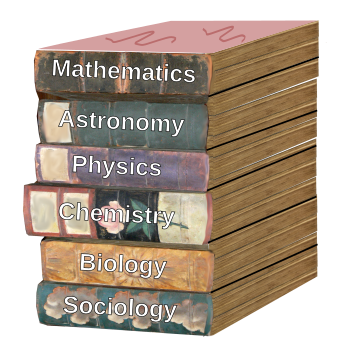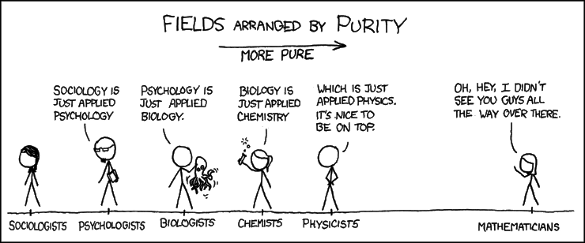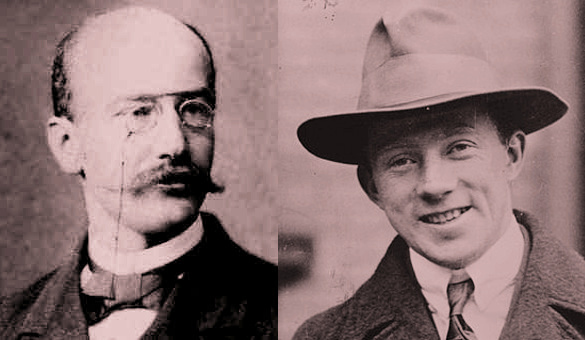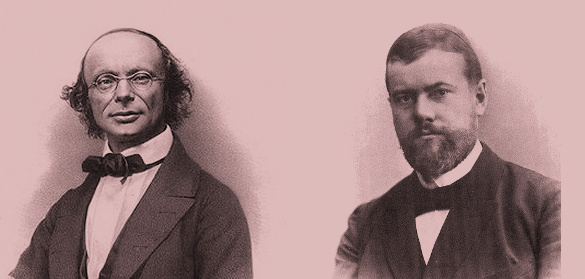Physics, Math, and Sociology
June 8, 2017
Physicists consider themselves to be at the top of the
scientific food chain. This is verified by the fact that the majority of the nineteen
Presidential Science Advisors were physicists. Notable physicist-advisors include
Isidor Rabi (1898-1988),
David Allan Bromley (1926-2005),
Frank Press (b. 1924), and
Guyford Stever (1916-2010).
A noted
chemist,
George Kistiakowsky (1900-1982), somehow broke into these ranks. The first Science Advisor,
Vannevar Bush (1890-1974), was an
electrical engineer, as was
Oliver Buckley (1887-1959). I wrote about Vannevar Bush and Guyford Stever in previous articles (
Basic Research, October 22, 2010, and
H. Guyford Stever, May 18, 2011).

Auguste Comte's ranking of sciences.
This ranking places the more phenomenological disciplines towards the bottom.
(Created using GIMP and Inkscape from a Wikimedia Commons image by Wolfgang Sauber.)
Auguste Comte (1798-1857), considered by many to be the first
philosopher of science, actually placed physics somewhat in the middle of the sciences, with
astronomy and
mathematics holding the places of most esteem (see figure).[1] His ranking placed the more
phenomenological disciplines towards the bottom, and the more fundamental disciplines at the top. Comte considered the topmost sciences to be more advanced, with a progression of
complexity from the top to the bottom. For example, the
laws of chemistry depend on the laws of physics, and not the other way around. This ranking, with astronomy lumped together with physics, persists today, as the following
cartoon illustrates.

A cartoon from Randall Munroe's xkcd Comics, licensed under a Creative Commons Attribution-NonCommercial 2.5 License. (xkcd comic 435.)
Physicists use a lot of mathematics, and most would agree with Comte's scheme of ranking mathematics as more fundamental than physics. This, however, presumes that physics and mathematics are both
research disciplines, so we arrive at the very fundamental question of whether mathematics is
discovered, or
invented.[2]
Plato, and contemporary mathematician,
Roger Penrose, believe that mathematics is discovered, as do I, so I'm in good company.
Pi, the
ratio of the
circumference to the
diameter of a
circle, is found in many fundamental
equations of physics, so it appears that pi has a physical
reality independent of an observer. If you're a mathematician in the discovery camp, you do mathematics by looking for solutions that already exist. The mathematics is
somewhere, waiting to be discovered; that is, the pure
idea has an existence, which is a Platonist concept. Those mathematicians in the invention camp believe that mathematics is just another
intellectual product of
human culture.
An interesting
anecdote about the attitude of mathematicians to physics involves
Werner Heisenberg (1901-1976), who was awarded the 1932
Nobel Prize in Physics "for the creation of
quantum mechanics." Heisenberg had initially wanted to become a mathematician, so he interviewed to become a
student of
Ferdinand von Lindemann (1852-1939).

Ferdinand von Lindemann (1852-1939), left, and a 1927 photograph of Werner Heisenberg (1901-1976), right. ( and von Lindemann photograph and Heisenberg photograph via Wikimedia Commons, modified for artistic effect.)
Lindemann, who was famous for proving that pi was a
transcendental number, was 68, somewhat
deaf, close to
retirement, and the
quintessential grumpy old mathematician. When Heisenberg told him that he had read
Hermann Weyl's, "
Raum, Zeit, Materie" (Space, Time, Matter),[3] Lindemann told him that his mathematics career was hopelessly contaminated. Heisenberg ended up as a student of
theoretical physicist,
Arnold Sommerfeld, who also had provoked Lindemann's
disdain.[4]
The wide gap between physics and sociology has been bridged; and, like most bridges, the
traffic has been bidirectional, in sociology investigating physics, and physics advancing sociology. The social structure of the occasional isolated
Amazon tribe might be interesting, but how much more interesting is the culture of nearly a million physicists?[5] This is the realm of the field of the
sociology of scientific knowledge. Prominent sociologists in this field include
Paul Feyerabend (1924-1994),
Thomas Kuhn (1922-1996), and
Derek John de Solla Price (1922-1983). I wrote about Kuhn in a previous article (
Fifty Years of Paradigm Shifting, February 25, 2013. As one example, sociologists embedded themselves at
CERN during the early years of the
Large Hadron Collider, a 10,000-person physics project.[6]
In the other direction we have
social physics in which physicists use their tools to develop a better understanding of the
human condition. Comte, whom I mentioned above, believed that social physics could discover the
natural laws of social culture.
Belgian statistician,
Adolphe Quetelet, wrote a 1835 book, "Sur l'homme et le développement de ses facultés, ou Essai de physique sociale" (Essay on Social Physics: Man and the Development of his Faculties), in which he proposed the application of
statistics to sociology. He was essentially looking for the
root causes of cultural attributes such as
crime. He also proposed the idea of the
average man who sits atop the
bell curve.

A tale of two Webers. Left, Wilhelm Eduard Weber (1804-1891), and right, Maximilian Karl "Max" Weber (1864-1920). Wilhelm Weber was a German physicist who co-invented the electric telegraph with colleague, Carl Friedrich Gauss (1777-1855). He was also the first to use the letter "c" to denote the speed of light in an 1856 paper co-authored with Rudolf Kohlrausch (1809-1858). The unit of magnetic flux, the weber, is named after him. Max Weber, one of the first sociologists, proposed that there are multiple causes for any outcome. He is best known for conflation of the Protestant work ethic, the rise of capitalism, and the institution of the rational nation-state. (Left image and right image via Wikimedia Commons.)
The prolific science writer,
Philip Ball, has written a book that demonstrates how
systems theory can elucidate such social phenomena as
traffic flow,
economics, and the structure of
cities.[7] Social physics is now enabled by "
big data," harvested from various
Internet sources, that combines data from such human activities as
Facebook posting,
web browsing history, and
credit card purchases. A recent example of a social physics paper can be found in ref. 8.[8] If you look at the lower right-hand corner of this page, you'll see that
Tikalon supports the
Electronic Frontier Foundation in putting limits on how much of our personal data is shared.
Of course, there's still much about sociology that makes it a far different science than physics. Any cursory examination of introductory
textbooks in the two fields will show a vast difference in the number of
references - About a hundred for physics, versus nearly a thousand in sociology, with physics references going back many years, and the sociology references much more contemporary.[9] Also, physics textbooks will have about the same content from one to another, while sociology textbooks are quite different from one
decade to the next.[9] Physics speaks of fundamental laws, while sociology is always searching for its path.
References:
- Auguste Comte, Stanford Encyclopedia of Philosophy, October 16, 2014.
- Julie Rehmeyer, "Math Trek-Still debating with Plato," Science News, April 25, 2008.
- Hermann Weyl, "Raum, Zeit, Materie - Vorlesungen über allgemeine Relativitätstheorie," J. Springer (Berlin, 1919), 296 pp., via archive.org.
- David Lindley, "Uncertainty," Knopf Doubleday Publishing Group, February 12, 2008, p. 79, via Google Books.
- Charles Day, "One million physicists," Physics Today, April 17, 2015, DOI:10.1063/PT.5.010310.
- Zeeya Merali, "The Large Human Collider," Nature, vol. 464, March 24, 2010, pp. 482-484, doi:10.1038/464482a.
- Philip Ball, "Why Society is a Complex Matter," Springer, June 9, 2012, ISBN 978-3-642-28999-6.
- Matjaz Perc, Jillian J. Jordan, David G. Rand, Zhen Wang, Stefano Boccaletti, and Attila Szolnoki, "Statistical physics of human cooperation," arXiv, May 19, 2017
- Stephen Cole, "The Hierarchy of the Sciences?," American Journal of Sociology, vol. 89, no. 1 (July, 1983), pp 111-139, https://doi.org/10.1086/227835.
Permanent Link to this article
Linked Keywords: Physicist; science; scientific; food chain; Science Advisor to the President; Presidential Science Advisor; Isidor Rabi (1898-1988); David Allan Bromley (1926-2005); Frank Press (b. 1924); Guyford Stever (1916-2010); chemist; George Kistiakowsky (1900-1982); Vannevar Bush (1890-1974); electrical engineering; electrical engineer; Oliver Buckley (1887-1959); science; phenomenology; phenomenological; GIMP; Inkscape; Wikimedia Commons; Auguste Comte (1798-1857); philosophy of science; philosopher of science; astronomy; mathematics; complexity; physical law"; cartoon; xkcd 435; Randall Munroe; xkcd Comics; Creative Commons Attribution-NonCommercial 2.5 License; research; discovery (observation); discovered; invention; invented; Plato; Roger Penrose; pi; ratio; circumference; diameter; circle; equation; reality; observer effect (physics); idea; intellectual; human culture; anecdote; Werner Heisenberg (1901-1976); Nobel Prize in Physics; quantum mechanics; postgraduate education; student; Ferdinand von Lindemann (1852-1939); transcendental number; hearing loss; deaf; retirement; quintessential; grumpy; Hermann Weyl; Raum, Zeit, Materie; theoretical physics; theoretical physicist; Arnold Sommerfeld; disdain; traffic; Amazon River; tribe; sociology of scientific knowledge; Paul Feyerabend (1924-1994); Thomas Kuhn (1922-1996); Derek John de Solla Price (1922-1983); CERN; Large Hadron Collider; social physics; human condition; nature; natural; Belgium; Belgian; statistician; Adolphe Quetelet; statistics; root cause; crime; normal distribution; bell curve; Wilhelm Eduard Weber (1804-1891); Maximilian Karl "Max" Weber (1864-1920); Germany; German; invention; invented; electrical telegraph; electric telegraph; colleague; Carl Friedrich Gauss (1777-1855); speed of light; scientific literature; paper; author; Rudolf Kohlrausch (1809-1858); magnetic flux; weber (unit); Protestant work ethic; capitalism; rational nation-state; Philip Ball; systems theory; traffic flow; economics; city; big data; Internet; Facebook posting; web browsing history; credit card purchase; Tikalon; Electronic Frontier Foundation; textbook; reference work; decade.